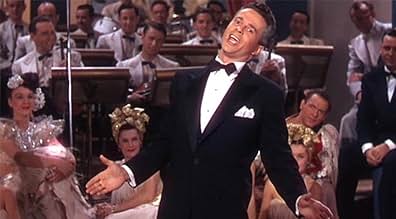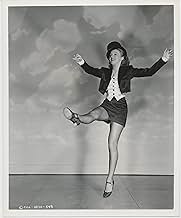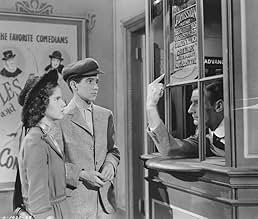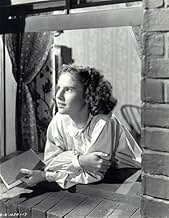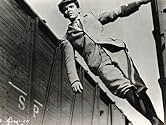IMDb RATING
7.2/10
1.9K
YOUR RATING
This movie shows the idealized career of the singer Al Jolson, a little Jewish boy who goes against the will of his father in order to be in showbiz. He becomes a star, falls in love with a ... Read allThis movie shows the idealized career of the singer Al Jolson, a little Jewish boy who goes against the will of his father in order to be in showbiz. He becomes a star, falls in love with a non-Jewish dancer, and marries her. In the end he chooses success on the stage.This movie shows the idealized career of the singer Al Jolson, a little Jewish boy who goes against the will of his father in order to be in showbiz. He becomes a star, falls in love with a non-Jewish dancer, and marries her. In the end he chooses success on the stage.
- Won 2 Oscars
- 5 wins & 5 nominations total
The Robert Mitchell Boy Choir
- Church Choir
- (as Mitchell 'Boychoir')
John Alban
- Audience Member
- (uncredited)
Rod Alexander
- Dancer
- (uncredited)
Jessie Arnold
- Wardrobe Woman
- (uncredited)
Frank Baker
- Audience Member
- (uncredited)
Steve Benton
- Audience Member
- (uncredited)
Edward Biby
- Audience Member
- (uncredited)
Featured reviews
Al Jolson, along with Frank Sinatra, were perhaps the two greatest singer/entertainers of the 20th Century. This film, made in 1946, was both the launching pad and "ball and chain" for Larry Parks. His performance was so good it earned him an Academy Award nomination. He spent countless hours perfecting the Jolson mannerisms and lip-syncing the songs that the great Jolson recorded for the movie. Unfortunately he became so typecast in the role that his reprise of the role in the sequel in 1949 was his only other claim to fame. That, and his admission and subsequent subliminal blacklist from Hollywood for being a member of the Communist Party between 1941-1951, stopped his career before it ever really had a chance to bloom.
My father had me watch this movie as a kid on Million Dollar Movie and I was taken by the personality, drive, energy, and talent of this great entertainer. Hearing about, and seeing, silent movies made me all the more in awe of the talent Jolson must have been since Hollywood banked it's future on talkies with "The Jazz Singer".
Besides Parks excellent performances are also put in by William Demerest, who many of us remember as Uncle Charlie in My Three Sons, Evelyn Keyes as Julie Benson (Jolson's first wife) and the rest of the cast. The 1949 making of Jolson Sings Again is also worthwhile, if for no other reason than watching Parks do the masterful lip-sync and the incredible vocals of Jolson.
My father had me watch this movie as a kid on Million Dollar Movie and I was taken by the personality, drive, energy, and talent of this great entertainer. Hearing about, and seeing, silent movies made me all the more in awe of the talent Jolson must have been since Hollywood banked it's future on talkies with "The Jazz Singer".
Besides Parks excellent performances are also put in by William Demerest, who many of us remember as Uncle Charlie in My Three Sons, Evelyn Keyes as Julie Benson (Jolson's first wife) and the rest of the cast. The 1949 making of Jolson Sings Again is also worthwhile, if for no other reason than watching Parks do the masterful lip-sync and the incredible vocals of Jolson.
This movie started the wave of biopics that began after WWII. Larry Parks doesn't look the least bit like Al Jolson. For that matter, the script doesn't look much like Jolson's life either. However, the film is very entertaining with a few ironies for the classic film buff. When Parks is on stage, you really get a taste of Jolson in his prime. Al Jolson actually tutored Parks in how to move and interact with the audience using his own style, and it comes across well, even if it is obvious that you are hearing Jolson's voice during the performances and that this voice does not match Larry Parks' speaking voice at all.
Jolson's life story has been sanitized here to keep in line with the values of the post-war motion picture production code, right down to extending the life of Jolson's mother an extra forty years - she died when Al was ten. Also, the movie has Jolson playing the career-absorbed bachelor until he meets his wife Julie Benson (code for Ruby Keeler) when he is in his forties. Yes, Al was career-absorbed, but he still went through two marriages and two divorces before he ever got to Ruby Keeler.
Two very interesting points of the film involve the insertion of the fictional character Steve Martin that allegedly got Al into show business and also the choice of director. The first interesting point is that fictional character Steve Martin is played by William Demarest, who actually had a bit part in 1927's "The Jazz Singer". You'll see him sharing a plate of eggs with Al at Coffee Dan's just minutes before Al bursts into song in "Toot Toot Tootsie". Demarest was a bit player over at Warner's during the beginning of his career. He had no real association with Al Jolson that I know of. The second interesting point is the choice of director - Alfred E. Green. Mr. Green was among that group of directors that ground out the early talkies for Warner Bros during the time that Jolson was a star at that studio. However, he never directed any of the eight motion pictures that Al Jolson starred in for Warners. There were four directors that Jolson worked with over at Warner Brothers that were still alive when this film was made, but for some reason none of them got the job.
At any rate, the movie is very entertaining and well-paced with great renditions of Jolson's acts and songs. For the unvarnished truth about Jolson's life, try to find a copy of the documentary "The Real Al Jolson Story" made in 1986 and originally telecast by Bravo, back when they really were dedicated to the performing arts and before they became so concerned with Top Chefs and Flipping Out - you know, the same kind of stuff you can find on 50 other channels.
Jolson's life story has been sanitized here to keep in line with the values of the post-war motion picture production code, right down to extending the life of Jolson's mother an extra forty years - she died when Al was ten. Also, the movie has Jolson playing the career-absorbed bachelor until he meets his wife Julie Benson (code for Ruby Keeler) when he is in his forties. Yes, Al was career-absorbed, but he still went through two marriages and two divorces before he ever got to Ruby Keeler.
Two very interesting points of the film involve the insertion of the fictional character Steve Martin that allegedly got Al into show business and also the choice of director. The first interesting point is that fictional character Steve Martin is played by William Demarest, who actually had a bit part in 1927's "The Jazz Singer". You'll see him sharing a plate of eggs with Al at Coffee Dan's just minutes before Al bursts into song in "Toot Toot Tootsie". Demarest was a bit player over at Warner's during the beginning of his career. He had no real association with Al Jolson that I know of. The second interesting point is the choice of director - Alfred E. Green. Mr. Green was among that group of directors that ground out the early talkies for Warner Bros during the time that Jolson was a star at that studio. However, he never directed any of the eight motion pictures that Al Jolson starred in for Warners. There were four directors that Jolson worked with over at Warner Brothers that were still alive when this film was made, but for some reason none of them got the job.
At any rate, the movie is very entertaining and well-paced with great renditions of Jolson's acts and songs. For the unvarnished truth about Jolson's life, try to find a copy of the documentary "The Real Al Jolson Story" made in 1986 and originally telecast by Bravo, back when they really were dedicated to the performing arts and before they became so concerned with Top Chefs and Flipping Out - you know, the same kind of stuff you can find on 50 other channels.
I have just watched the Jolson story on dvd and it is great, the music is fresh and the technicolor is fantastic.The story is loosely based on Jolsons life, though I think if your after a serious study of his career you should visit your libary and read up on his life.The acting is top notch, William Demarest is excellent as the Steve Martin a mentor to Jolson as he grows up then a manager of his career.I also like the performances of mama and the kantor.The Julie Benson charactor is supposed to be Ruby Keeler, they are the perfect couple but show business is the drug that Al Jolson is addicted to, and that eats into their relationship.The energy of this movie is tremendous it stays with you for hours the melodys linger in your head, its life affirming.The beauty of this dvd is that the sequel is also on the dvd so I will be watching that soon.Marks out of ten /9.5
I could sit and listen to Jolson music endlessly. First of all,he had to be the originator of soul music, sung right from the heart. We heard what he felt and then felt what he felt. Secondly,he was the only singer I ever heard whose voice sounded like a trumpet. Perfect pitch, clear,crisp and resounding. Hence, we put together those two attributes, add his showmanship, charm and charisma and we end up with the greatest single entertainer in the history of American show business. Larry Parks is truly astounding and gives a performance, including perfect lip synching, that should have earned him the Oscar. Politics came first, apparently.
The film, even with its occasional flaws, was amazingly entertaining. From the first scene to when his Julie Benson walks out by realizing that she could have never taken the music out of Jolson and vice versa,the entire production was pure hypnotic joy. Unbeatable music, warmth, tenderness and humility run wild. A superb feast for the ears and eyes. A never-to-be-forgotten film.
The film, even with its occasional flaws, was amazingly entertaining. From the first scene to when his Julie Benson walks out by realizing that she could have never taken the music out of Jolson and vice versa,the entire production was pure hypnotic joy. Unbeatable music, warmth, tenderness and humility run wild. A superb feast for the ears and eyes. A never-to-be-forgotten film.
"Let me sing a funny song, with crazy words that roll along, and if my song can make you happy, I'm happy.....I'm happy....." Al Jolson sang those words of the song, ' Let me sing and I'm happy,' in the opening of The Jolson Story, words that epitomized the passion and energy in his music. The Jolson Story does a magnificent job in giving us a taste of Jolson's magic that spellbound America in the twenties and early thirties, most of his songs are in the show, April Showers, Swanee, Mammy, California Here I Come and , the incomparable, The Anniversary Song, sang as only Jolson can. And, due to some enterprising technology at the time we also hear more of his voice in the Movie that perhaps his fans did in those days with Film Studio microphones capturing and accentuating a deep resonance that is solely Jolson's. The Film doesn't attempt to factually explore his life, although we do get a chance to see some truths of the relationship with his real life wife, Ruby Keeler, who in the Movie was known as Julie Benson, played by Evelyn Keys. Interesting to note was the fact that Columbia Pictures, who released the Movie failed to give Warner Bros.the Film company responsible for giving Jolson the role in The Jazz Singer, any recognition whatsoever, presenting further evidence of the Producer's and Jolson's desire to give us some entertainment, as opposed to a lesson in history. And, entertained we are, as Larry Parks, with his unbelievable miming to Jolson's songs......apart from a cameo from Jolson singing Swanee....takes us from Vaudeville days in the twenties with all Jolson's great songs and routines, to his semi retirement in the thirties. The Jolson Story is a wonderful experience, full of songs we still sing today more than fifty years after they were released, and sung by the man most of us remember as the greatest entertainer of them all......Al Jolson.
Did you know
- GoofsThe Jazz Singer (1927) had its world premiere at the Warner Theatre in New York, not the Winter Garden as depicted in the film (as "The Jolson Story" was a Columbia picture, the change is understandable).
- ConnectionsFeatured in The Soundman (1950)
- SoundtracksLet Me Sing and I'm Happy
(uncredited)
Written by Irving Berlin
Sung by Al Jolson over opening credits
Originally from Mammy (1930)
- How long is The Jolson Story?Powered by Alexa
Details
- Release date
- Country of origin
- Language
- Also known as
- Der Jazzsänger
- Production company
- See more company credits at IMDbPro
Box office
- Budget
- $2,800,000 (estimated)
- Runtime2 hours 8 minutes
- Aspect ratio
- 1.37 : 1
Contribute to this page
Suggest an edit or add missing content


